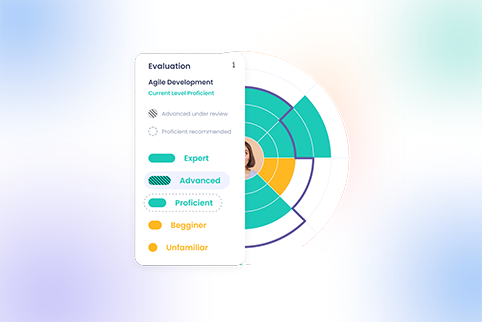
In today’s fast-paced world, where technological breakthroughs seem to occur overnight, economic trends can shift with the click of a button and workplaces are constantly evolving, it’s impossible to underestimate the value of recognizing emerging skills.
Take, for example, the seismic shifts triggered by the emergence of artificial intelligence (AI) and automation. Entire industries are being reshaped, job roles are transforming, and the skill sets essential for success are in a perpetual state of change.
For a better understanding, let’s look at the financial sector — a domain where Artificial Intelligence (AI) is revolutionizing traditional practices, reshaping how organizations detect fraud, forecast financial trends, and streamline operational processes. In this landscape, certain emerging skills are becoming indispensable, like data literacy for the interpretation of complex datasets and algorithmic risk management to ensure secure and reliable AI deployment.
Furthermore, the COVID-19 pandemic has accelerated certain trends, such as remote work and digital transformation, creating new opportunities and challenges in the job market. Skills related to remote collaboration, digital communication, and cybersecurity have gained prominence as organizations strive to adapt to this new normal.
Rest assured, in this article, our focus extends beyond acknowledging the importance of identifying emerging skills. Rather, we’re going to explore what it means to adapt and thrive in this new technological era. And, because we’re not just here to theorize, we’ll equip you with practical strategies on how to scout out these skills.
Why Emerging Skills Are Important?
The value of skills is diminishing faster than ever before, a concept illustrated by Stephane Kasriel, CEO of Upwork and a member of the World Economic Forum, through the analogy of the “half-life” of skills. Initially estimated at around five years, recent studies from the Digital Data Design Institute at Harvard’s Digital Reskilling Lab, in collaboration with the BCG Henderson Institute, paint a more accelerated picture, especially in tech fields.
The average half-life of skills is now less than five years, and in some tech fields it’s as low as two and a half years. For millions of workers, upskilling alone won’t be enough.
Therefore, it becomes imperative to explore why emerging skills are not only crucial but also indispensable in navigating this era of rapid technological advancement and evolution of skillsets.
1. Anticipation of Industry Trends:
Identifying emerging skills enables organizations to anticipate industry trends and position themselves strategically. According to a survey conducted by Deloitte, organizations that integrate a skills-based approach are 63% more likely to achieve results compared to those that don’t. Additionally, 61% of business executives acknowledge that new technologies like automation and artificial intelligence (AI), which demand new skill sets, will be the primary driver behind their organization’s adoption of a skills-based approach.
Whether it’s mastering new technologies, understanding changing consumer preferences, or adapting to regulatory shifts, staying informed about emerging skills is key to remaining relevant in today’s dynamic business environment.
2. Strategic Workforce Planning:
Effective workforce planning requires a deep understanding of the skills that will be in demand in the future. By identifying emerging skills, organizations can align their talent strategies with future needs, ensuring that they have the right people with the right skills in place.
Imagine a tech company gearing up to launch a groundbreaking new product. They recognize that to stay ahead of the competition, they need a workforce equipped with emerging skills in areas like machine learning and data analytics. By identifying these emerging skills early on, they can strategically plan their workforce.
Effective workforce planning requires this human touch—a deep understanding of the skills that will be in demand down the road. This proactive approach not only minimizes talent gaps but also reduces recruitment costs and fosters a culture of innovation and agility within the organization.
3. Talent Development and Retention:
Organizations that invest in talent development and provide opportunities for skill acquisition are more likely to attract and retain top talent. According to a report from Gallup, 57% of U.S. workers express a desire to update their skills, highlighting a strong appetite for continuous learning and improvement. What’s more, nearly half of these workers (48%) would even consider switching jobs to pursue skill development opportunities.
4. Addressing Societal Challenges:
Recognizing emerging skills isn’t just about economic growth; it’s about tackling real-world issues like unemployment and social inequality. Imagine a world where everyone has the skills they need to thrive in tomorrow’s workforce.
When businesses prioritize skill acquisition and offer training opportunities, they empower employees to adapt and thrive in an ever-changing job market. This not only boosts employee morale and loyalty but also enhances the company’s reputation as a socially responsible organization.
Emerging skills in the age of AI
In today’s AI-driven era, the rise of artificial intelligence and automation is fundamentally changing the skills needed in the workplace. Beyond the traditional technical competencies, there’s an increasing call for a combination of soft skills and digital proficiencies to complement AI capabilities and foster effective human-machine collaboration. Here’s a breakdown of the types of skills that are emerging:
Soft Skills:
While technical expertise and qualifications are essential, it’s the soft skills that truly differentiate exceptional performers and drive organizational success. Soft skills are a wide spectrum that include interpersonal, communication, and emotional intelligence abilities that enable individuals to collaborate effectively, navigate challenges, and thrive in diverse work environments. Here are several emerging soft skills:
- Critical Thinking:
Organizations rely on employees to not only process information but to discern patterns, uncover insights, and make informed decisions that drive strategic outcomes. Critical thinking is not merely a nice-to-have skill; it’s a fundamental pillar of organizational success in the AI era. A report by the World Economic Forum sheds light on the shifting landscape of skills demanded by the workforce of the future, critical thinking ranking among the top emerging skills required by 2025.
- Emotional Intelligence:
As AI assumes more repetitive tasks, interpersonal interactions become an increasingly important emerging skill. For efficient teamwork, conflict resolution, and customer engagement, emotional intelligence—which includes empathy, communication, and networking skills—becomes imperative.
- Adaptability:
The relentless pace of technological change demands adaptability and resilience from employees. By cultivating a workforce that is open to learning, resilient in the face of change, and agile in adapting to new realities, organizations can position themselves for sustained success and competitive advantage. Employees must be open to learn new skills, embrace change, and adjust to evolving roles and responsibilities in AI-integrated environments.
- Cultural Competence:
In today’s globalized and multicultural workplaces, individuals who possess cultural competence are better equipped to navigate complex social dynamics, build strong relationships, and collaborate effectively across borders. It involves understanding different cultural norms, values, and communication styles to foster inclusivity and respect. For organizations with a global presence or diverse customer base, cultural competence is critical for building rapport and trust with customers from different cultural backgrounds.
Digital Skills:
In today’s hyper-connected world, the importance of digital skills transcends mere competence—it defines an organization’s capacity to thrive in a rapidly evolving landscape. From leveraging data analytics to optimizing customer experiences, digital skills empower organizations to innovate, adapt, and succeed in the digital age. Here are some examples of emerging digital skills that are shaping the future of work:
- Data Literacy:
Data literacy, or the ability to understand, interpret, and communicate with data, is an increasingly valuable emerging skill. From frontline employees to C-suite executives, proficiency in data literacy enables individuals at all levels of the organization to make informed decisions, identify opportunities, and mitigate risks with confidence.
- Machine Learning and AI Literacy:
While not everyone needs to be a machine learning expert, a basic understanding of machine learning principles and AI technologies is becoming increasingly important across various roles and industries. This enables employees to collaborate with AI systems, interpret AI-generated insights, and identify opportunities for automation and optimization.
- Cybersecurity Awareness:
Cybersecurity awareness is not merely a compliance requirement but a strategic imperative. The integration of AI brings both opportunities and risks to organizations. While it enables automation and innovation, it also creates new vulnerabilities for cyber adversaries to exploit. Employees need to understand the risks associated with AI technologies, adhere to security best practices, and recognize potential vulnerabilities to safeguard sensitive information and systems.
- Remote Collaboration Tools:
As companies embrace flexible work arrangements and global talent pools, the ability to effectively communicate, collaborate, and coordinate across geographical boundaries has emerged as a critical competency for employees at all levels. According to a recent survey by Buffer, based on the experiences of 3,000 remote workers, an overwhelming majority 82% of respondents are working from home, with more than half 64% being fully remote.
Strategies for Identifying Emerging Skills
The ability to foresee and adjust to changing skill demands becomes critical as businesses fight to stay competitive and as individuals aim to climb the corporate ladder. By anticipating future skill demands and investing in the development of relevant competencies, organizations can position themselves as industry leaders and attract top talent.
From leveraging industry insights and data analytics to engaging with subject matter experts and promoting continuous learning, organizations can employ a variety of strategies to thrive amidst change and uncertainty.
1. External Market Libraries:
External market libraries are invaluable resources that offer insights into evolving skill demands, industry trends, and technological advancements. These libraries compile data from a wide range of sources, including market research firms, industry associations, and government agencies, providing a holistic view of the job market landscape.
Using platforms like Nestor can become a great solution for identifying emerging skills and driving workforce agility, high performance, and continuous growth. By tapping into external market libraries, enhanced by AI suggestions, Nestor empowers organizations to anticipate future skill needs and support employees on their journey to success in the digital age.
2. Skills Benchmarking:
Skills benchmarking emerges as a strategic tool, enabling the assessment of current skill sets against industry standards and best practices. This process allows stakeholders to identify gaps between existing skill sets and emerging skill requirements, providing valuable insights for talent development and strategic planning. By benchmarking skills, organizations can prioritize skill development initiatives, address competency gaps, and enhance their competitiveness in the job market.
3. Networking and Expert Interviews:
Networking serves as a cornerstone for organizations aiming to understand the pulse of emerging skills. By cultivating relationships with professionals actively involved in the industry, organizations gain access to real-time insights and experiences that can inform talent development strategies and future planning initiatives, and facilitate the identification of emerging skills directly from those actively shaping the industry landscape.
4. Internal Skills Mapping and Analysis:
The foundation of internal skills mapping and analysis lies in assessing the current skill sets of employees. This process involves a comprehensive evaluation of employees’ current skill sets, identification of future skill demands, and the formulation of targeted training and development initiatives to bridge skill gaps and prioritize skill development initiatives aligned with your company’s long-term vision and objectives.
In a process like this, a platform like Nestor can be your best friend. With its advanced skills mapping and analysis features, Nestor unveils talents that might otherwise remain undiscovered. By integrating skills data with performance metrics, or career aspirations, Nestor provides organizations with a 360-degree view of their talent pool. This comprehensive approach enables organizations to pinpoint high-potential talent, nurture their growth, and create pathways for career advancement.
5. Low Supply of High Demand Skills
Another strategy for identifying emerging skills is to look for skills that are in high demand but are possessed by few people. Let’s say a company in the technology sector is looking to expand its services to include blockchain development, a field that is rapidly gaining traction and is in high demand across various industries. After analyzing their internal talent pool, they find that only a handful of employees have experience or expertise in blockchain development.
By examining job postings, industry reports, and labor market data, the company realizes that there is a significant shortage of professionals with blockchain development skills in the market. Despite the high demand for blockchain developers, there are relatively few people who possess the necessary expertise.
Recognizing this gap between demand and supply, the company decides to invest in training and upskilling initiatives, targeted towards their existing employees, so they can become proficient in blockchain development. They offer specialized training programs, workshops, and certifications to equip their employees with the skills needed to excel in this emerging field. By focusing on skills that are in high demand, the company not only addresses its immediate staffing needs but also strengthens its competitive position and ability to meet the evolving demands.
Final Thoughts
In essence, recognizing and cultivating emerging skills isn’t just a strategic imperative; it’s a fundamental aspect of organizational growth and sustainability in the 21st century. From the rise of artificial intelligence and automation to the shift towards remote work and digital transformation, emerging skills play a pivotal role in shaping the future of work. Organizations that proactively identify and invest in these skills stand to gain a competitive edge, attract top talent, and adapt more effectively to changing market demands.







